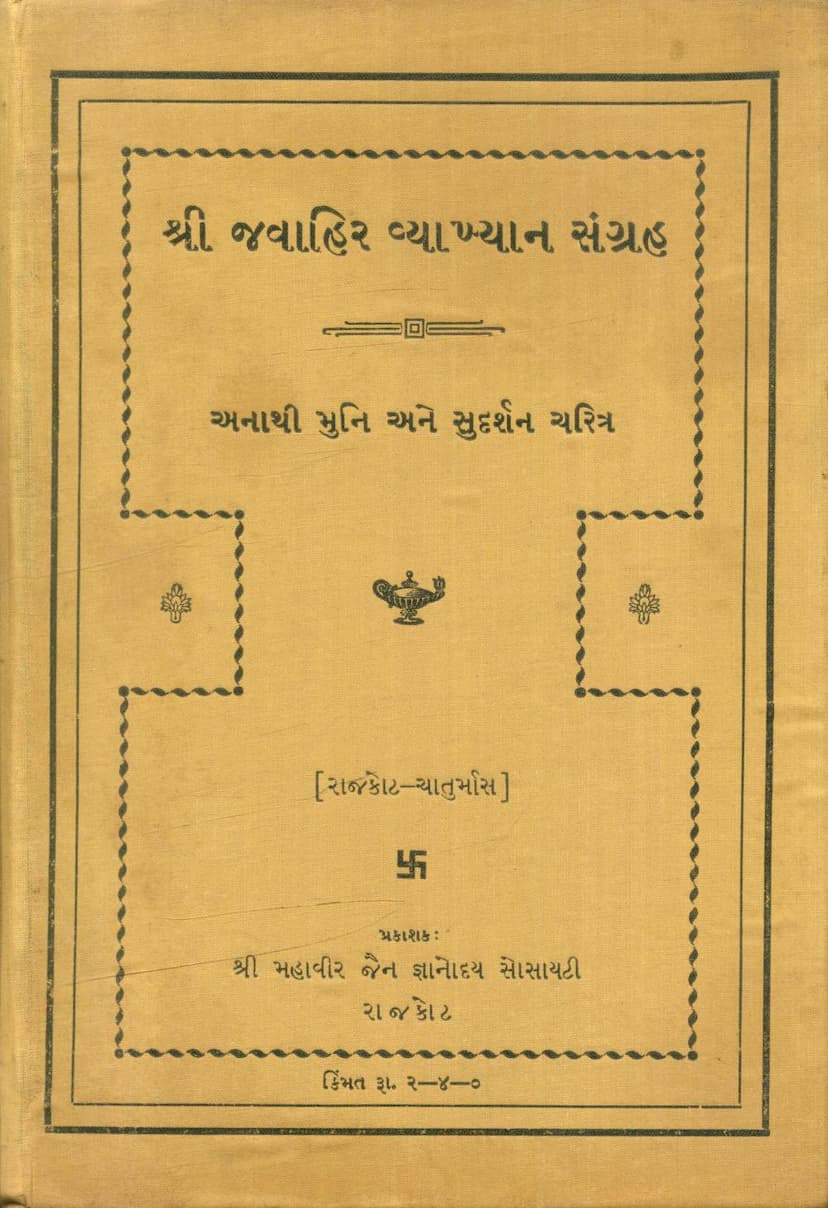Jawahir Vyakhyan Sangraha Part 01 Anathimuni And Sudarshan Charitra
Added to library: September 2, 2025

Summary
This is a comprehensive summary of the Jain text "Jawahir Vyakhyan Sangraha Part 01 - Anathimuni and Sudarshan Charitra" by Jawahirlal Maharaj, published by Mahavir Jain Gyanoday Society. The book contains discourses delivered during the Chaturmas in Rajkot.
Overall Theme:
The collection of discourses by Acharya Jawahirlalji Maharaj, compiled in "Jawahir Vyakhyan Sangraha Part 01," focuses on key Jain principles through the lens of two significant figures from Jain tradition: Anathimuni and Sudarshan Seth. The overarching theme is the pursuit of spiritual upliftment and liberation from worldly suffering by understanding and practicing Jain philosophy, emphasizing Ahimsa (non-violence) and Anekantavada (non-absolutism). The discourses aim to guide the audience towards a virtuous and spiritually enriched life.
Key Components of the Discourses:
The book is structured around a tripartite format for each discourse:
-
Invocation/Prayer: Each discourse begins with a prayer dedicated to a specific Tirthankara. These prayers, often based on compositions by Vinaychandji Kumbhat, highlight the importance of prayer in personal development. Maharajshri emphasizes that prayer is a powerful tool for making life disciplined and divine, even in the age of intellectualism and declining faith. He acknowledges the potential skepticism towards prayer in the modern era but stresses its role as a life-giving medicine for overcoming negative emotions.
-
Anathimuni's Teachings (from Uttardhyayan Sutra): A significant portion of the discourses delves into the teachings of Anathimuni, particularly from the Mahānimanthiya chapter (Chapter 20) of the Uttardhyayan Sutra. The central message extracted from this chapter is the concept of "Be your own doctor."
- Self-Reliance and Inner Strength: The core teaching is that individuals are their own creators and destroyers of happiness and sorrow. The soul (Atma) is its own friend and foe. By tapping into the soul's inherent power, one can overcome all three types of suffering (physical, mental, and spiritual).
- Spiritual Freedom: The discourses explain how to achieve spiritual freedom and become "sanath" (self-reliant, having a master within) by overcoming attachment to external objects and realizing the soul's inherent strength. The soul's dependence on external objects is identified as the root cause of suffering.
- The Essence of the Teachings: The summarized essence of this teaching is captured in the verse:
"अप्पा कत्ता विकत्ता य, दुहाण य सुहाण य । अप्पा मित्तममित्तं य, दुप्पट्ठियं सुप्पट्ठियो ।।" (The soul itself is the maker and destroyer of sorrow and happiness. The soul itself is its own friend or enemy, its own protector or destroyer.)
- Scholarly and Experiential Insights: Maharajshri's discourses on this topic are noted for their deep scriptural research and scholarly presentation, drawing parallels from the Gita, Upanishads, Shankara Bhashya, Avesta, and the Quran, all viewed through the lens of Anekantavada. His own experiential wisdom is also conveyed.
-
Sudarshan Seth's Biography (Charitra): To simplify complex spiritual concepts for the general public, the discourses conclude with the life story of Sudarshan Seth. This narrative style, known as Prathamanuyoga (primary narrative), is particularly beneficial for beginners in understanding Dharma.
- Emphasis on Sheel (Chastity/Integrity): Sudarshan Seth's life story primarily highlights the virtue of Sheel. His unwavering commitment to integrity, even in the face of extreme adversity and temptation, serves as a powerful example.
- Interconnected Virtues: While Sheel is the central theme, the narrative also subtly incorporates the importance of Daan (charity), Tapa (austerities), and Bhav (inner disposition).
- Social Relevance: The life of Sudarshan Seth is presented in a way that touches upon various aspects of social life and reform. Topics like animal husbandry (Gauraksha), city administration (Nagar Vyavastha), population control (Santati Niyaman), celibacy (Brahmacharya), educational systems, the meaning of human life, and the universality of Jainism are woven into the narrative. Sudarshan Seth is portrayed not just as a virtuous individual but also as a social reformer and nation-builder, imparting valuable lessons through his life experiences.
Author's Style and Purpose:
Acharya Jawahirlalji Maharaj's discourse style is described as:
- Relevant to the era: His approach is contemporary and effective.
- Instructive and Inspirational: His words are enlightening and motivating.
- Accurate and Impactful: His explanations are precise and leave a lasting impression.
The primary purpose of publishing this collection is to propagate the fundamental principles of Jainism. It also aims to benefit those who live in smaller towns or in countries where Jain monks might not regularly visit, ensuring that the essence of Dharma reaches a wider audience.
Key Themes and Principles Explored:
- Ahimsa: The collection deeply explores the principle of Ahimsa, presenting it as a path to universal happiness and peace.
- Anekantavada: The concept of Anekantavada is highlighted as a means to resolve internal conflicts and foster understanding.
- Self-Realization: The discourses guide individuals towards understanding their true nature and achieving self-realization.
- Reincarnation and Spiritual Journey: Concepts like rebirth, Leshya (types of spiritual energy), and the soul's journey are illuminated.
- Ethical Living: The teachings promote ethical conduct, moral values, social reform, and national development.
Structure and Content:
The book provides a detailed index of the discourses, covering a wide range of topics discussed over several months, including prayers to various Tirthankaras, philosophical discussions on the self, the nature of happiness and suffering, the importance of virtuous conduct, and the practical application of Jain principles in daily life.
Overall Impact:
"Jawahir Vyakhyan Sangraha Part 01" serves as a comprehensive guide to understanding and practicing Jain dharma, offering profound spiritual insights and practical wisdom for living a meaningful and purposeful life. It highlights the expansive and all-encompassing nature of Jainism, positioning it as a universal path accessible to all.